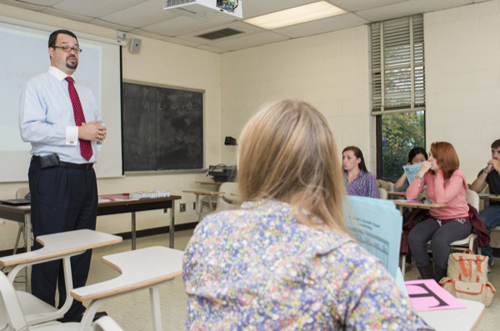Bank of America volunteer speaks to FYE students on ins and outs of credit
As an attendance sheet floated around the room, one by one the students in a University of Delaware First Year Experience (FYE) class signed their names, wrote down their home states (New York, Pennsylvania and beyond), and were quick to mark a check in the “Did not have high school personal finance class” column.
Yet minutes later by a show of raised hands, the vast majority of the students acknowledged they use a debit card, credit card or both.
Enter John O’Connor, a finance manager at Bank of America. O’Connor is one of a number of Bank of America employee volunteers who will visit 24 classes this semester to present lessons on credit or general money management to select UD freshmen whose FYE instructors have chosen to include the topic within the course program.
Now in its sixth consecutive year, the program with Bank of America continues to provide UD’s Center for Economic Education and Entrepreneurship (CEEE) with the funding and manpower necessary for the center to extend a piece of its high school personal finance curriculum to new UD students.

A Bank of America volunteer speaks to UD students during a Sept. 26 session. Image credit: Kathy F. Atkinson
The topic in the Oct. 2 session: “Credit: The Most Important Grade You’ll Ever Earn.”
O’Connor began by sharing a skit from Saturday Night Live, “Don’t Buy Stuff You Cannot Afford.” Although the video was comical, the message was simple and straightforward: manage your finances and only buy what you can afford.
“Some of the best things you can do to build a foundation for a sound financial future are to set goals, spend less than you make, and save early, save often and invest,” said O’Connor.
For the remainder of the class, O’Connor had the students work in teams to answer a 12-question true/false quiz.
Some questions the students had no trouble with; they understood a missed credit card payment can impact a person’s credit score, that buying goods and making only a minimum payment will dramatically increase the ultimate cost of a purchase, and that managing your credit wisely will increase the choices you have in the future related to the type of housing, transportation, recreation and education available to you.
The students also snickered at the statement “Using a credit card on impulse doesn’t affect your budget;” it was clear they knew that statement to be false.
But some other aspects of personal finance were not as clear to the students.
When asked about the criteria used to determine a credit score, all student teams agreed that payment history, new credit issued, length of credit history, income and types of credit play a role. But O’Connor pointed out a hidden keyword – income – and quickly explained that a credit score is not a function of how much someone makes.
In addition, only about half of the students were certain that the recommendation of financial planners to not allow total debt to exceed 20 percent of yearly after-tax income nor monthly payments to exceed 10 to 15 percent of monthly net income (not including mortgage) was true.
“The key here is to manage your money by knowing what you have and saving and spending based on that,” said O’Connor. “Strategies like the 20-10 rule help you monitor and adjust your finances accordingly.”
Since Bank of America volunteers began working with CEEE on this program, they have reached 3,300 freshmen.
The exit evaluations, much like the question on the attendance sheet, repeatedly show that college freshmen are often receiving such finance education for the first time; however, they are also grateful for the lessons.
“I didn’t have financial classes in high school and this was definitely informative since we’re adults now and need to know how to manage our money,” said student Margaret McNamara.
Added Rachel Coyne, who enjoys international business and may one day seek a career in government, “I didn’t know anything about credit scores. It’s interesting to know your credit score can impact what kind of job you can get and it’s good to know as I pursue my career.”
– Article by Kathryn Meier
*Source: University of Delaware
